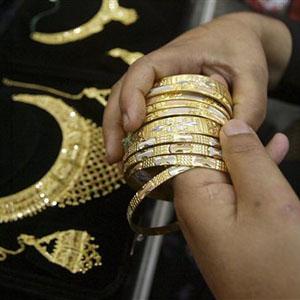
This is the VOA Special English Economics Report.
The best example of something is often called the "gold standard." It sets the standard against which other things are measured. In economics, the term describes how major trading nations once used gold to set currency values and exchange rates. Many nations continued to use the gold standard until the last century.
In the United States, people could exchange paper money for gold from the 1870s until 1933. President Richard Nixon finally disconnected the dollar from the value of gold in 1971. Some politicians from time to time call for a return to the gold standard.
But in 1978 the International Monetary Fund ended an official gold price. The IMF also ended the required use of gold in transactions with its member countries.
Since that time, gold prices have grown, but unevenly. Prices -- uncorrected for inflation -- are now at record highs. The current price is above 1,400 dollars an ounce.
But people keep buying. Neang Chan Nuon is a gold shop owner in the Cambodian capital, Phnom Penh.
NEANG CHAN NUON: "Some of my customers have even bought more as they believe the price will probably go higher. I sell more gold at these higher prices." Some people are "gold bugs." These are investors who say people should buy gold to protect against inflation.
People have valued gold for thousands of years. The soft, dense metal polishes to a bright yellow shine and resists most chemical reactions. It makes a good material for money, political power -- and, more recently, electrical power. If you own a device like a mobile phone or a computer, you might own a little gold in the wiring.
The gold standard was the subject of one of the best-known speeches in American political history. It took place at the 1896 Democratic National Convention in Chicago.
William Jennings Bryan wanted the country to use both gold and silver as money. The idea was to devalue the dollar and make it easier for farmers pay their debts. Here is Bryan reading his speech much later, in 1921.
WILLIAM JENNINGS BRYAN: "You shall not press down upon the brow of labor this crown of thorns. You shall not crucify mankind upon a cross of gold."
The speech made William Jennings Bryan famous. He was a presidential candidate three times. But he never won.
And that's the VOA Special English Economics Report, written by Mario Ritter. I'm Steve Ember.
(來源:VOA 編輯:崔旭燕)
